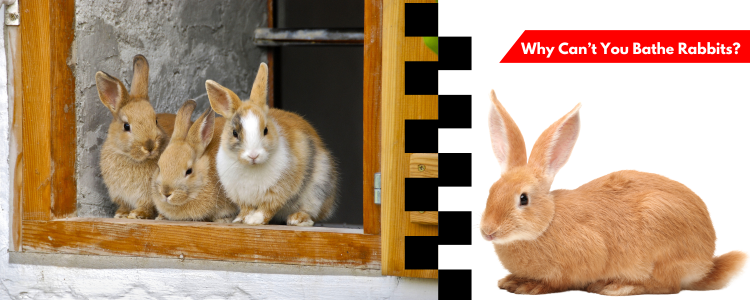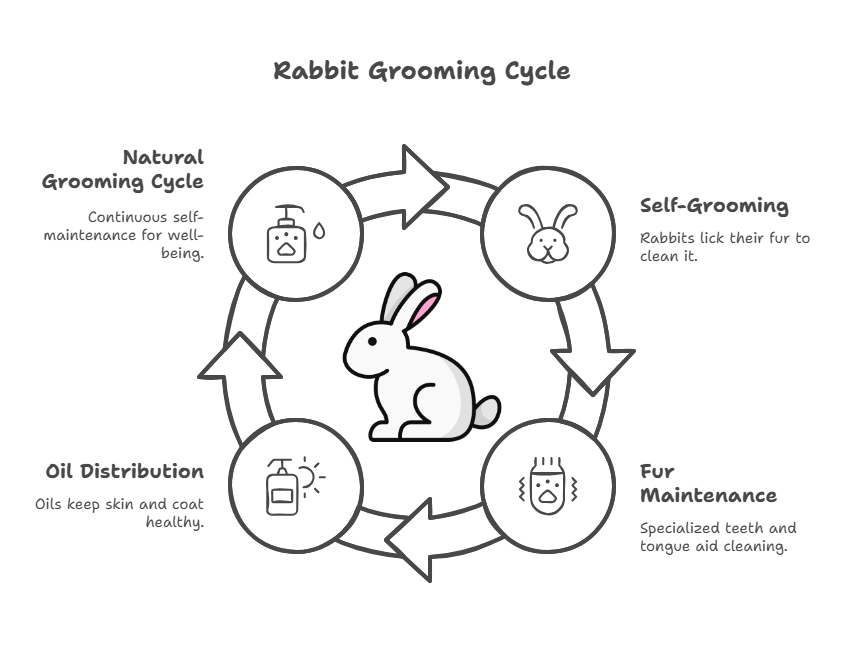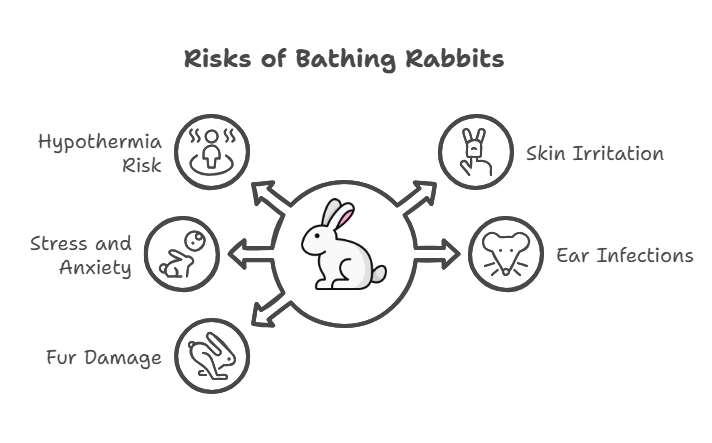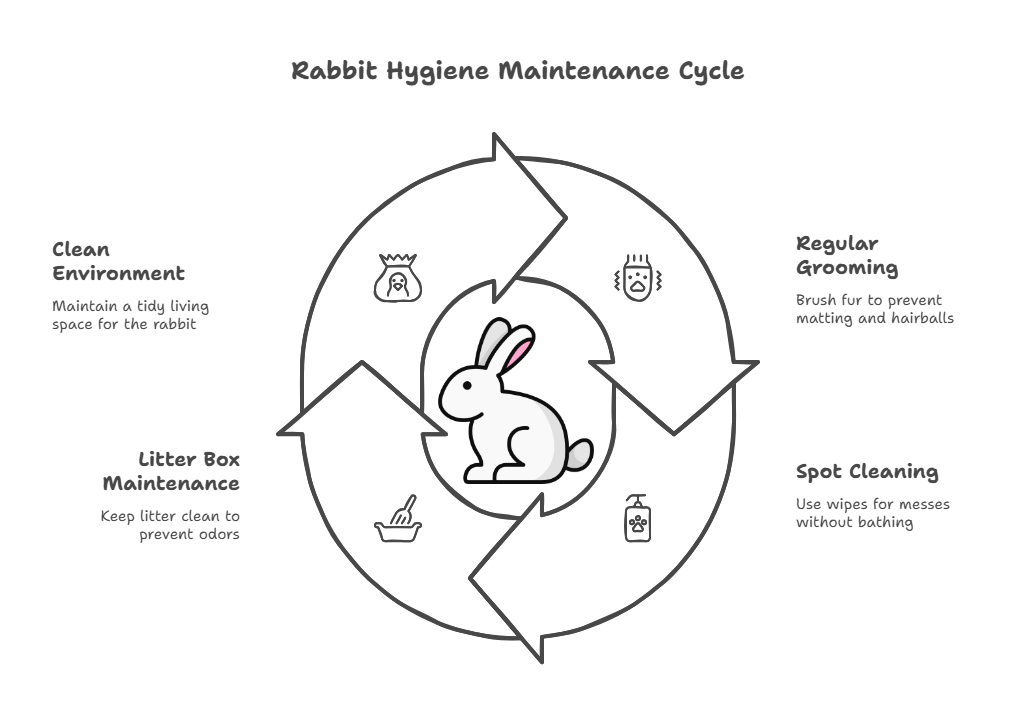Rabbits don’t need baths because they are naturally clean and groom themselves thoroughly. Bathing pets is a common practice among many pet owners. It’s easy to think that rabbits, like other animals, need occasional baths to stay clean. However, you may be surprised to learn that bathing rabbits is not only unnecessary but can be harmful to their health. In this article, we will explain why you should never bathe your rabbit, what the risks are, and how to properly care for your bunny’s hygiene without the need for a bath.
Understanding Your Rabbit’s Natural Grooming Abilities
Rabbits are naturally clean animals. In the wild, rabbits groom themselves regularly by licking their fur and cleaning their bodies. Their fur is self-regulating, and they rarely need human intervention for grooming. When a rabbit is healthy and living in a clean environment, it will naturally keep itself clean without the need for baths.
Their grooming behavior is vital to their well-being. Rabbits have specialized teeth and tongues that help them clean and maintain their fur. Their fur also contains oils that help keep their skin and coat healthy. Bathing a rabbit disrupts these natural oils and can cause skin dryness, irritation, or other issues.
The Dangers of Bathing Rabbits
Rabbits have very delicate skin, and bathing them can be harmful in several ways. Here are the main reasons why you should avoid bathing your rabbit:
1. Risk of Hypothermia
Rabbits are very sensitive to temperature changes. After a bath, they may become chilled, especially if their fur gets wet and they don’t have a chance to dry off properly. Rabbits lack sweat glands, so they cannot regulate their body temperature as efficiently as humans or other animals. Wet fur can lead to hypothermia, which is a dangerous condition where the rabbit’s body temperature drops too low. Hypothermia can be life-threatening if not addressed promptly.
2. Skin Irritation and Dryness
Rabbits’ skin is much thinner and more sensitive than humans. The harsh chemicals in shampoos or soaps, even those designed for animals, can cause irritation or allergic reactions. Wet fur also strips away natural oils that protect their skin. Without these oils, rabbits can develop dry, flaky skin, which can be uncomfortable and lead to skin infections.
3. Stress and Anxiety
Bathing can be a very stressful experience for rabbits. Rabbits are prey animals, and being submerged in water can trigger fear and anxiety. The sensation of being bathed or held in water can overwhelm a rabbit, causing panic. Stress can negatively impact a rabbit’s health, leading to digestive issues or behavioral changes. It’s crucial to minimize stress for your pet, and bathing is one of the biggest stressors for rabbits.
4. Risk of Ear Infections
Rabbits have long ears that are prone to infection if moisture gets trapped inside. Bathing your rabbit can cause water to enter the ears, creating a perfect environment for bacteria to grow. Ear infections are common in rabbits and can lead to serious health issues if not treated promptly. Keeping your rabbit’s ears dry and clean is essential for their well-being.
5. Damage to Their Fur
Rabbits have very fine fur that can easily become matted when wet. Bathing can cause their fur to become tangled, leading to painful mats that may need to be trimmed out. In some cases, mats can get so tight that they cause skin irritation or infection. By avoiding baths, you help preserve the integrity of your rabbit’s fur.
How to Keep Your Rabbit Clean Without a Bath
Luckily, you don’t need to bathe your rabbit to keep it clean. Here are some safe and effective ways to maintain your rabbit’s hygiene:
1. Regular Grooming
Brushing your rabbit’s fur is the best way to keep them clean and prevent matting. Rabbits, especially long-haired breeds, need regular brushing to remove loose fur and dirt. Depending on the breed, you may need to brush your rabbit daily or weekly. Regular grooming will also help prevent hairballs, which can lead to digestive issues if ingested.
2. Spot Cleaning
If your rabbit gets into something messy, you can clean the area with a damp cloth or baby wipe. Make sure to only spot clean the affected area, and avoid getting your rabbit’s entire body wet. Always use gentle, pet-safe wipes to avoid skin irritation.
3. Litter Box Maintenance
Rabbits are very clean animals and typically use a litter box. Keep your rabbit’s litter box clean by changing the litter regularly and cleaning the box with mild, non-toxic soap. A clean litter box helps maintain a clean environment for your rabbit.
4. Keep Their Environment Clean
A clean living space plays a significant role in your rabbit’s overall cleanliness. Ensure that their cage or play area is free of excess waste and dirt. Clean the bedding regularly and provide fresh hay and water daily.
What to Do If Your Rabbit Gets Really Dirty
There are rare occasions when your rabbit might get exceptionally dirty, such as getting something sticky on its fur or getting into a mess that cannot be cleaned by brushing alone. In these cases, it is important to act quickly but gently:
- Use a Damp Cloth: Lightly dampen a cloth with warm water and gently wipe off the mess. Be careful not to get the fur too wet.
- Use Baby Wipes: If your rabbit is comfortable with it, you can use unscented baby wipes or wipes designed for pets to clean the soiled area.
- Consult a Veterinarian: If your rabbit has gotten into something that cannot be cleaned at home, or if it appears to be in distress, consult a veterinarian. They can provide proper care and advice.
What About Fleas and Parasites?
If your rabbit has fleas or other parasites, you should avoid using regular flea treatments or bathing. Instead, speak with a veterinarian about the safest way to treat the problem. There are many rabbit-safe parasite treatments available that will not harm your pet. Regular grooming can also help you spot any signs of fleas or other pests early.
Bottom Line
Bathing rabbits is not only unnecessary but can be harmful to their health. Their natural grooming behaviors are sufficient to keep them clean and healthy. Instead of bathing, focus on regular grooming, a clean living environment, and spot cleaning when necessary. By respecting your rabbit’s natural instincts and taking proper care of their hygiene, you’ll help ensure they live a long, healthy life.
FAQs
-
Can I bathe my rabbit if it’s very dirty?
No, it’s best to avoid full baths. Spot cleaning with a damp cloth is usually sufficient. -
How often should I groom my rabbit?
This depends on the breed. Short-haired rabbits may need grooming once a week, while long-haired breeds require daily brushing. -
What should I do if my rabbit has fleas?
Consult a veterinarian for safe, rabbit-specific flea treatments. Do not use products meant for other animals. -
Can wet fur make my rabbit sick?
Yes, wet fur can cause hypothermia or skin infections. Always keep your rabbit dry and warm. -
How do I know if my rabbit has a skin infection?
Signs of skin infections include redness, sores, scabs, or excessive scratching. If you notice any of these signs, contact a vet.




